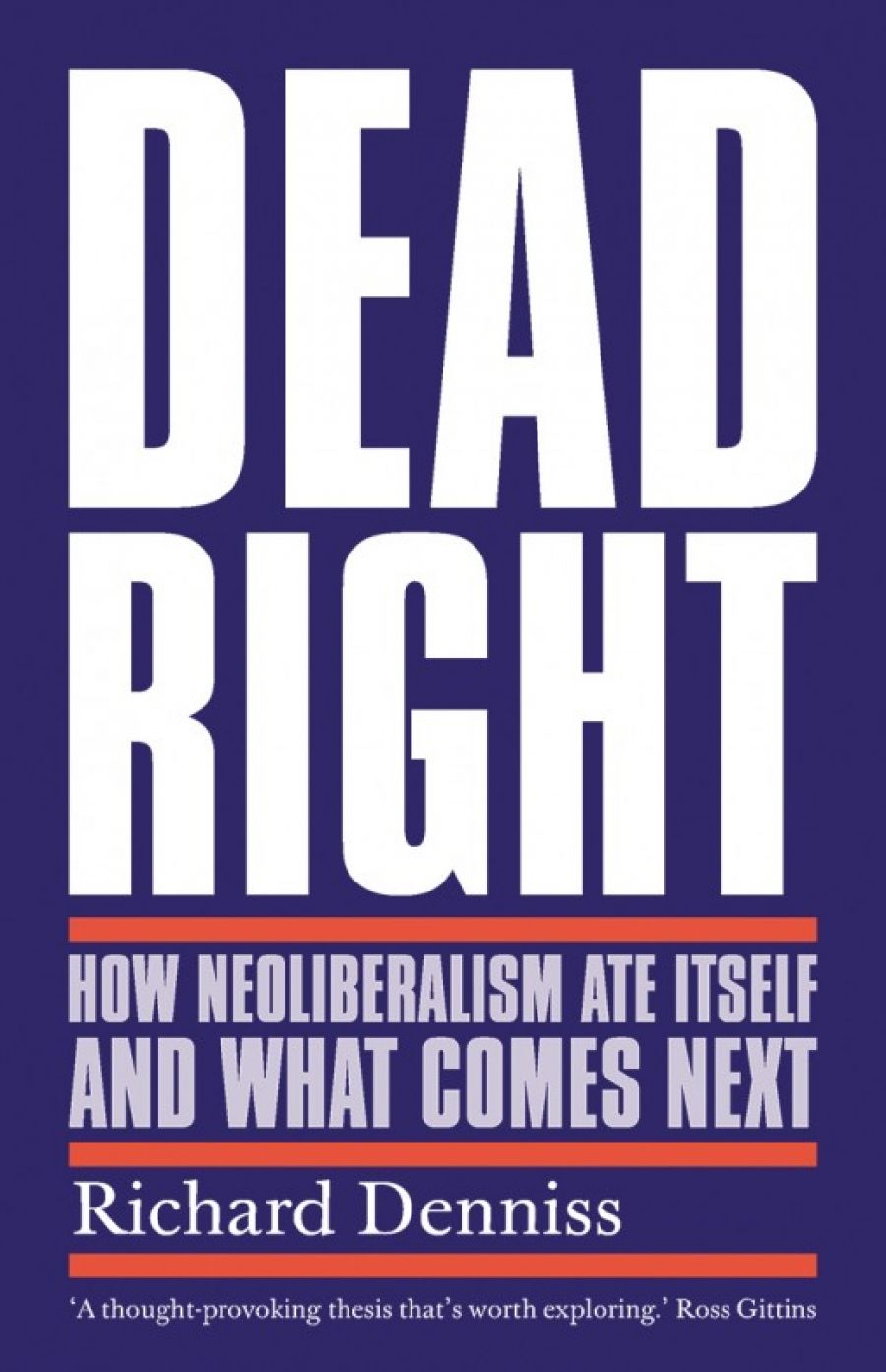
- Free Article: No
- Contents Category: Politics
- Custom Article Title: Rubik Roy reviews <em>Dead Right: How neoliberalism ate itself and what comes next</em> by Richard Denniss
- Custom Highlight Text:
A spectre is haunting Australia, that of neo-liberalism. For the last thirty years, both major parties have subscribed to its tenets in order to propitiate big business. It is an ideology (and language) that dare not speak its name. Instead, from London, from Berlin, from Washington, DC, politicians beat the gongs of ...
- Book 1 Title: Dead Right
- Book 1 Subtitle: How neoliberalism ate itself and what comes next
- Book 1 Biblio: Black Inc., $24.99 pb, 192 pp, 9781760641306
Denniss does not explore how neo-liberalism diverged so far from its liberal roots, or how classical liberal ideas were reinvented by Friedrich August von Hayek, and later Milton Friedman, as a response to Keynesianism. Nor does he address the spread of neo-liberalism under Margaret Thatcher, Ronald Reagan, and the Washington Consensus. Giving a history lesson is not Denniss’s aim. He focuses, instead, on Australia, where no politician publicly avows neo-liberalism, whose footprints are everywhere. Denniss explains how the deregulation of banks, the privatisation of the aged care sector and the electricity industry, and the outsourcing ‘of finding suitable homes for vulnerable children’ have allowed illegal and immoral corporate behaviour, death, malnourishment, and soaring electricity prices, all while making huge profits for corporations.
 Richard Denniss (photograph via the Victorian Women's Trust)
Richard Denniss (photograph via the Victorian Women's Trust)
Denniss notes that one of neo-liberalism’s keywords is ‘competitiveness’, which is used to argue for lower corporate taxes, lower wages, and job cuts. According to Denniss, the undue stress on competitiveness seems to ignore one of the core tenets of classical liberalism: ‘that all countries have a “comparative advantage” in the production of some goods, even if the absolute cost of producing those goods is lower in another country’. The application of neo-liberal policies has been piecemeal because, as Denniss points out, politics in Australia is based on interests rather than ideology. Politicians lack the discipline or simply the conviction to pursue real market fundamentalism. He finds evidence of this selective application in government subsidies for coal mines, new regulation of the electricity industry, and even calls by some politicians, such as Tony Abbott and Gladys Berejiklian, to nationalise coal-fired power stations and sports stadiums respectively. Denniss claims that neo-liberalism gives the rich and powerful a convenient doublespeak to package their interests as the national interest, and ‘[w]ithout such a cloak, policies to slash income support for those most in need while giving tax cuts to those with the most money would just look nasty’.
Denniss is not the first economist to declare that neo-liberalism is dead (Nobel laureate Joseph Stiglitz did so in 2016), by which he means that ‘the right no longer places neo-liberal ideas at the centre of its rhetoric and policies’. Perhaps it does not have to. As Denniss himself asserts, neo-liberal language, ideas, and policy not only permeate the economy but also Australian culture and identity, from weapons manufacturers such as BAE Systems, Lockheed Martin, and Thales sponsoring the Australian War Memorial, to McDonald’s patronising children’s hospitals, to Westpac owning the naming rights of the Rescue Helicopter Service. Even a sports stadium is named after Suncorp, the finance company. These sponsors, Denniss claims, pay a fraction of the costs, yet they, and not taxpayers, get most of the recognition. Neo-liberalism, he implies, has transformed ‘the heart and soul of the nation’. While Denniss sees conservatives’ calls for state intervention as the death knell for neo-liberalism, and understands the selective application of neo-liberalism as interests driven, is it possible that neo-liberalism is not simply the obverse of state intervention but can also use the state for its own purposes? Can the symbiotic relationship between the state and big businesses, and the inseparability of political and economic spheres, mean that the state and its institutions embody neo-liberalism? Having read his arguments, the reader may agree with Denniss that neo-liberalism has been a harmful and undemocratic influence, but if it is dead, its spectre is yet to be exorcised.


Comments powered by CComment